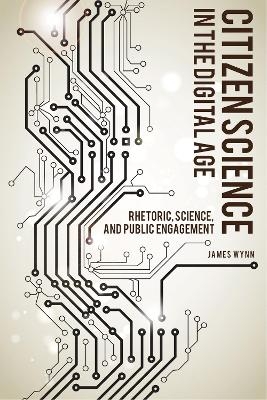
Citizen Science in the Digital Age
Rhetoric, Science, and Public Engagement
Seiten
2017
The University of Alabama Press (Verlag)
978-0-8173-1943-4 (ISBN)
The University of Alabama Press (Verlag)
978-0-8173-1943-4 (ISBN)
In Citizen Science in the Digital Age, James Wynn tackles the benefits and pitfalls of citizen science— scientific undertakings that make use of public participation and crowd-sourced data collection.
James Wynn’s compelling investigation into citizen science highlights public-based studies and probes the rhetoric these studies employ. Many of these endeavors, such as the widely-used SETI@home project, simply draw on the processing power of participants’ home computers; others, like the protein-folding game FoldIt, ask users to take a more active role in solving scientific problems. In Citizen Science in the Digital Age: Rhetoric, Science, and Public Engagement, Wynn analyzes the discourse and rhetoric that enable these scientific ventures, as well as the difficulties that arise in communication between scientists and lay people and the potential for misuse of publicly gathered data.
Wynn puzzles out the intricacies of these exciting new research developments by focusing on various case studies. He explores the Safecast project, which originated from crowd-sourced mapping for Fukushima radiation dispersal, arguing that evolving technologies enable public volunteers to make concrete, sound, science-based arguments. Additionally, he considers the potential use of citizen science as a method of increasing the public’s identification with the scientific community, and contemplates how more collaborative rhetoric might deepen these opportunities for interaction and alignment. Furthermore, he examines ways in which the lived experience of volunteers may be integrated with expert scientific knowledge, and also how this same personal involvement can be used to further policy agendas.
There are precious few texts exploring the intersection of rhetoric, science, and the Internet. Citizen Science in the Digital Age aims to fill this gap, offering a clear, intelligent overview of the topic intended for rhetoric and communication scholars as well as practitioners and administrators of a number of science-based disciplines. With the expanded availability of once inaccessible technology and computing power to laypeople, the practice of citizen science will only continue to grow. This study offers insight into how—given prudent application—citizen science might elucidate the rhetoric and strengthen the relationships between scientists and laypeople.
James Wynn’s compelling investigation into citizen science highlights public-based studies and probes the rhetoric these studies employ. Many of these endeavors, such as the widely-used SETI@home project, simply draw on the processing power of participants’ home computers; others, like the protein-folding game FoldIt, ask users to take a more active role in solving scientific problems. In Citizen Science in the Digital Age: Rhetoric, Science, and Public Engagement, Wynn analyzes the discourse and rhetoric that enable these scientific ventures, as well as the difficulties that arise in communication between scientists and lay people and the potential for misuse of publicly gathered data.
Wynn puzzles out the intricacies of these exciting new research developments by focusing on various case studies. He explores the Safecast project, which originated from crowd-sourced mapping for Fukushima radiation dispersal, arguing that evolving technologies enable public volunteers to make concrete, sound, science-based arguments. Additionally, he considers the potential use of citizen science as a method of increasing the public’s identification with the scientific community, and contemplates how more collaborative rhetoric might deepen these opportunities for interaction and alignment. Furthermore, he examines ways in which the lived experience of volunteers may be integrated with expert scientific knowledge, and also how this same personal involvement can be used to further policy agendas.
There are precious few texts exploring the intersection of rhetoric, science, and the Internet. Citizen Science in the Digital Age aims to fill this gap, offering a clear, intelligent overview of the topic intended for rhetoric and communication scholars as well as practitioners and administrators of a number of science-based disciplines. With the expanded availability of once inaccessible technology and computing power to laypeople, the practice of citizen science will only continue to grow. This study offers insight into how—given prudent application—citizen science might elucidate the rhetoric and strengthen the relationships between scientists and laypeople.
James Wynn is an associate professor of English at Carnegie Mellon University and the author of Evolution by Numbers: The Origins of Mathematical Argument in Biology.
| Erscheinungsdatum | 15.02.2017 |
|---|---|
| Reihe/Serie | Alabama Rhetoric Culture and Social Critique Series |
| Zusatzinfo | 11 B&W figures |
| Verlagsort | Alabama |
| Sprache | englisch |
| Maße | 152 x 229 mm |
| Gewicht | 500 g |
| Themenwelt | Sachbuch/Ratgeber ► Beruf / Finanzen / Recht / Wirtschaft ► Briefe / Präsentation / Rhetorik |
| Geisteswissenschaften ► Sprach- / Literaturwissenschaft ► Sprachwissenschaft | |
| Naturwissenschaften ► Geowissenschaften ► Meteorologie / Klimatologie | |
| Sozialwissenschaften ► Kommunikation / Medien ► Allgemeines / Lexika | |
| Sozialwissenschaften ► Kommunikation / Medien ► Kommunikationswissenschaft | |
| ISBN-10 | 0-8173-1943-3 / 0817319433 |
| ISBN-13 | 978-0-8173-1943-4 / 9780817319434 |
| Zustand | Neuware |
| Haben Sie eine Frage zum Produkt? |
Mehr entdecken
aus dem Bereich
aus dem Bereich
der unverzichtbare LEGO® SERIOUS PLAY® Praxis-Guide für Workshops, …
Buch | Hardcover (2023)
Hanser (Verlag)
CHF 55,95
Die Rede des Häuptling Seattle an den Präsidenten der Vereinigten …
Buch | Hardcover (2024)
Patmos Verlag
CHF 14,90
die wichtigste Kompetenz unserer Zeit erfolgreich nutzen
Buch | Softcover (2023)
GABAL (Verlag)
CHF 45,95


